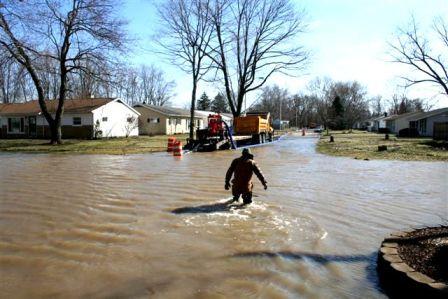
|
Roads may be closed because they have been damaged and/or are covered by water. Barricades have been placed for your protection. If you come upon a barricade or a flooded road, go another way. TURN AROUND, DON'T DROWN. Listen to the radio about what to do, where to go or places to avoid. Emergency workers will assist people in flooded areas. You can help them by staying off the roads & out of the way. If you must walk or drive in areas that have been flooded: Stay on firm ground. Moving water 6 inches deep can sweep you off your feet. Water may be electrically charged from underground/downed power lines. Avoid walking & driving through flooding. Flooding often erodes roads & walkways, which may cause familiar places to change & hides debris. Play it safe. Additional flooding or flash floods can occur. If your car stalls in rapidly rising waters, get out immediately & climb to higher ground. |
|
A flood can cause emotional and physical stress. Follow the tips below to help ensure that you and your loved ones remain healthy as you focus on clean up and repair. Rest often and eat well. Keep a manageable schedule. Make a list and do jobs one at a time. Avoid direct contact with flood or backed-up water when possible. Children & pets should not play in or near, or come in contact with flood water. After cleaning up your home, makes sure to do the following before removing your latex gloves: Sanitize or dispose of aprons & other clothing worn during clean-up. Disinfect rubber foot-wear in a bucket using bleach disinfectant. Disinfect buckets and other such materials used in clean-up before storing them. Remove latex gloves from the inside-out & wash hands for at least 2 minutes with warm water & a disinfectant soap to assure all skin surfaces are clean of contaminants. Discuss your concerns with others and seek help. Contact the Red Cross for information on emotional support. |
Turn off the electricity at the main breaker or fuse box, even if the power is off in your community. While cleaning up flooded areas, wear protective clothing & gear, such as latex & waterproof, impenetrable rubber boots to prevent exposure to sewage. TIP: Contact the Department of Public Health to receive protective rubber gloves. Use a disinfectant solution of laundry bleach (5.25% hypochlorite) for clean-up. Place all disposables in a sealed bag for garbage collection & removal. Contact your insurance agent to discuss claims. TIP: If you choose to hire, check references to if see they are qualified. Be wary of people who drive through neighborhoods offering help. |
|
Contact your local chapter to receive information about resources and assistance that may be available to you:
|
||||

